Professional ozone generator with an oxygen concentrator and a powerful control unit. To be installed in an agricultural sprayer. It performs foliar treatment with ozonated water for your crop.
Agricultural foliar ozone
Foliar treatment with ozone for agriculture
Installation of ozone in agricultural sprayer

Use of ozone on agricultural sprayer
Uso del ozono para tratamiento foliar con atomizador
Ventajas y beneficios del uso del agua ozonizada en atomizadores agrícolas para higienización de cultivos
Instalar un generador de ozono profesional en el atomizador, le permitirá producir agua altamente ozonizada con la que podrá realizar tratamientos foliares en su cultivo, reduciendo el uso de fitosanitarios, y reduciendo el impacto medio ambiental. El ozono en tratamiento foliar, es una técnica de higienización de cultivos, que está revolucionando la agricultura. Los beneficios que aporta al agricultor, así como su fácil manejo y bajo coste de explotación, le convierten en una magnífica herramienta para reducir y prevenir enfermedades, ahorrando dinero y potenciando su cultivo. ZonoSistem tiene una amplia experiencia en el diseño de generadores de ozono para agricultura. A continuación, le vamos a explicar cómo se hace este
Professional ozone generators to protect and improve your agricultural crop
Do you want to improve your foliar treatment?
Do you want to reduce the use of phytosanitary products in your foliar treatments?
Do you want to save on chemical products and their management?
Do you want your crops to be more ecological?
Do you want your crop to be more sustainable?
Does your crop have any diseases that are difficult to control?
Do you have to pay the high cost of chemicals? Does your crop have low profitability?
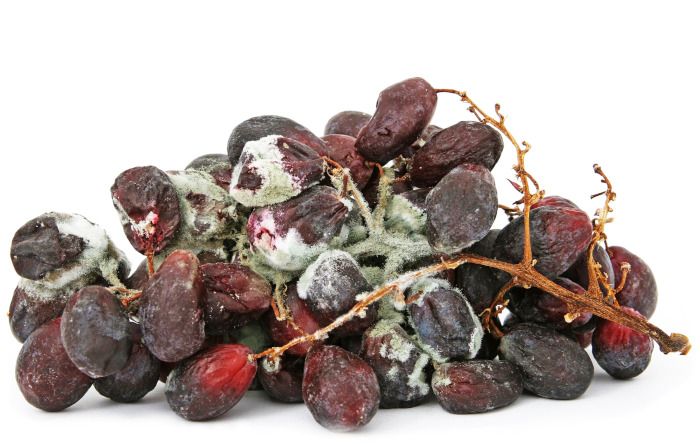
We carry out foliar treatments with ozone in all types of crops
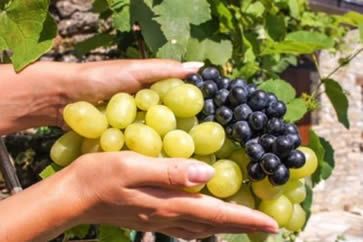
Ozone for Vineyard
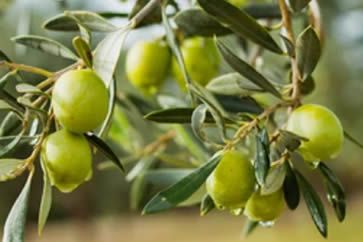
Ozone for Olive trees
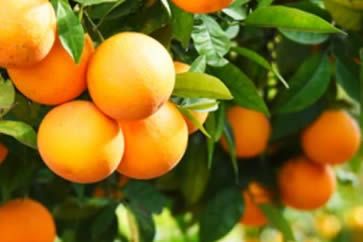
Ozone for Citrus and Fruit Trees
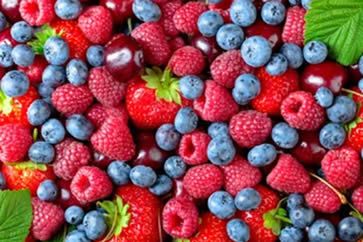
Ozone for berries
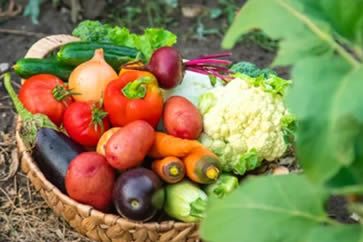
Ozone for potato, tomato, cucumber, garlic...

Ozone for football field and golf...
4 reasons to use ozone in foliar treatment
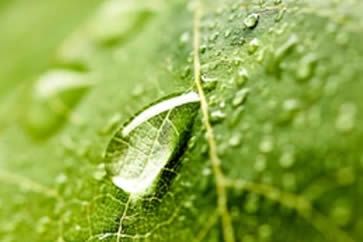
1. Sanitize and disinfect crops
Ozone is a powerful gaseous oxidant. It is very effective in eliminating bacteria, viruses, protozoa, nematodes, fungi, cell aggregates and spores. It causes damage to the cell wall, harming the entire microorganism. It also prevents the development of strong strains. The application of water with ozone on the surface of the plant as a foliar treatment will eliminate all types of microorganisms, reduce the development of diseases, and also the losses and accelerated deterioration of the fruits.
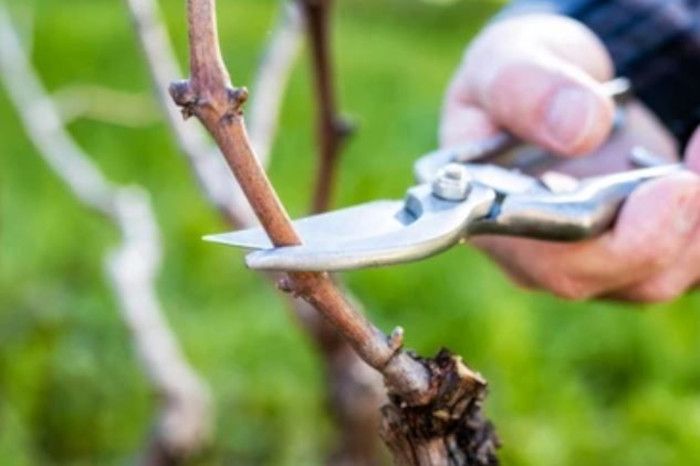
2. Accelerates healing after pruning
The oxidizing power of ozone gas and its high oxygen content increases the speed of healing after pruning dramatically. It also prevents the entry of diseases and reduces the "bleeding" of the plant. It also enhances the crop with that extra oxygen dissolved in the water.
Applying ozone during or immediately after carrying out the tasks that affect the integrity of the plant, can considerably reduce the diseases of your crop.

3. Save on phytosanitary products
Using water and ozone, you can reduce the consumption of phytosanitary products, save money, reduce the chemical pressure on the crop and reduce the traces of chemicals in the final product (this will prevent that they reach the consumer). Markets and regulations are increasingly demanding with respect to the use of chemicals, phytosanitary products and pesticides in agriculture. This is due to the health problems derived from their intake. Ozone is a smart alternative. It will reduce the impact of the chemical on both consumers and the environment.

4. Ozone does not contaminate the plant, the fruit, or the environment
Ozonized water does not leave residues in the environment, it DOES NOT accumulate in the plant, fruits, soil or groundwater. Ozone is very powerful, but only for a few minutes. After that it will be transformed again into oxygen.
Do you want to be more sustainable and more ecological?
Take advantage of the powerful capacity of ozone improving your crop. It does not leave residues
A correct foliar ozone treatment generates important benefits for the farmer, the consumer, and the environment.
but... where does the Ozone come from?
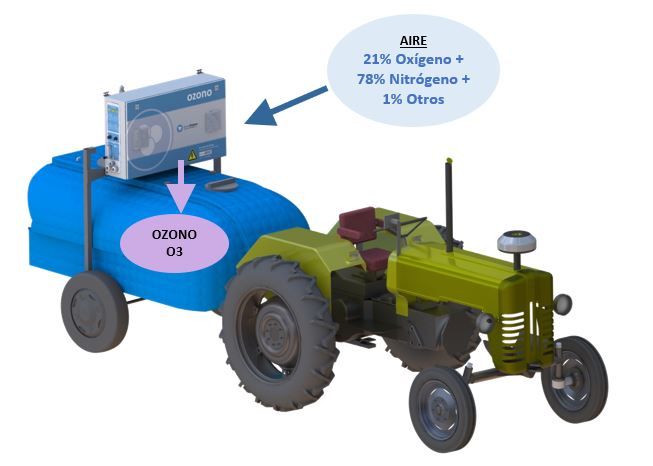
Ozone is generated in situ and diluted in the atomizer
Ozone is neither stored nor transported. It is a gas that is generated on site. The ozone equipment takes air from the atmosphere, concentrates the oxygen up to 95% purity, and through electrical discharges, the oxygen (O2) is converted into ozone (O3).
You just need to install the ozone generator on the agricultural sprayer and fill the tank with water!
The electricity will be taken from the tractor's alternator.
How is ozone injected with the water in your sprayer?
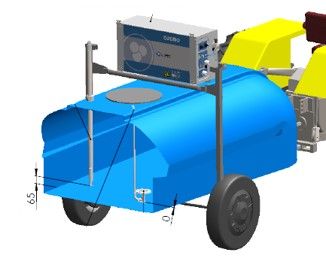
Double Ozone Outlet...
Bubbling + injection
From the cabin of the tractor you can choose between bubbling ozone in the tank or injecting ozone directly into the line. The generators prepared for agricultural sprayers include a double ozone dilution system. Bubbling will allow you to reach between 0.5 and 3 ppm of ozone (depending on the ozone power installed and the volume of water in the tank). When using injection in the water line you can reach from 0.5 to 10 ppm of ozone (depending on the ozone power installed, the flow rate and the pressure of the pump).
Change modes with a single Click!
Not all agricultural sprayer pumps support in-line injection. However, you can always get enough ppm of ozone using bubbling method. Having both systems in one will allow you to get the most out of your investment.
How is ozone controlled and measured in the sprayer tank?
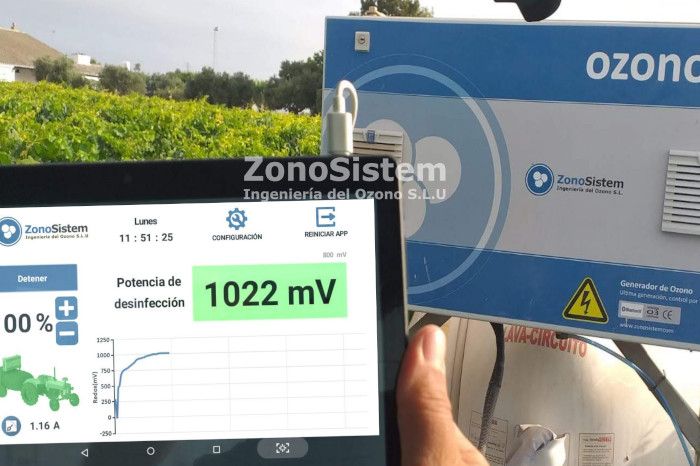
With a Redox Meter or ppm meter
All our ozone systems for agricultural sprayer include a continuous Redox measurement probe with a range of up to 2,000mV. The Redox value is an indicative of the equivalent dissolved ozone and represents the capacity of the water to oxidize, disinfect and heal. The Redox probe is located in a measuring cup that has a very easy access, so it is easy to clean and then prevent its deterioration when using chemicals. We also have ozone meters which measure dissolved ozone in ppm on the water line. We add it as an option.
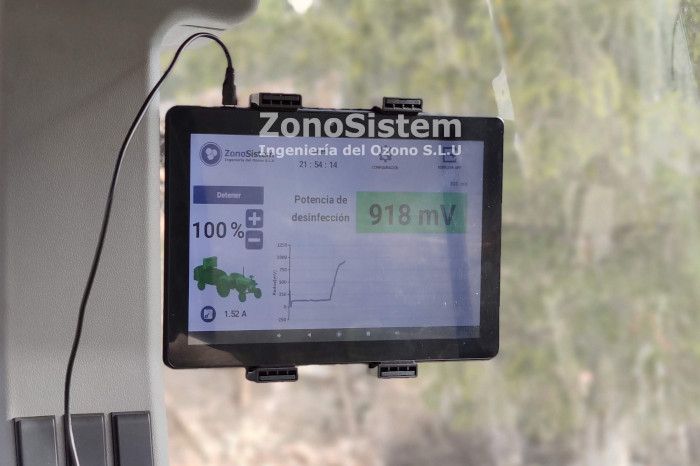
With Tablet from the cabin
From the cab of the tractor you can see (in real time) how much ozone you are dealing with. You can also modify the power or ozone level and select the injection mode, using your Android mobile or tablet. You just have to install our APP and connect it to the device via Bluetooth. You can also monitor the levels that are reached and the status of the ozone generator (electricity consumption, oxygen flow, alarms, etc.) and see them on a graph. Control your ozone equipment from the tractor cab.
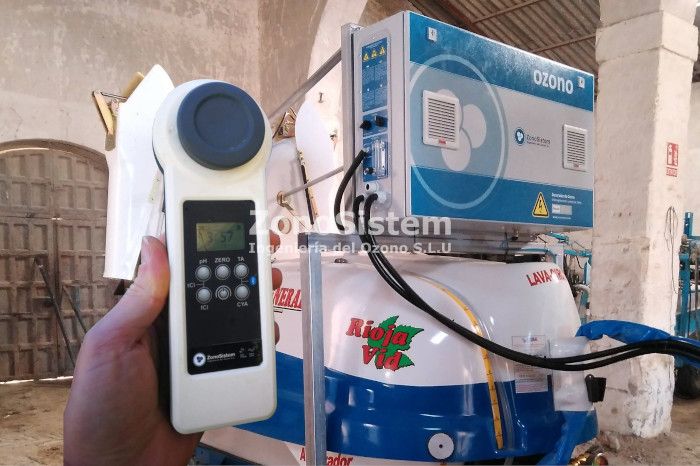
With verification in ppm
We recommend that you verify the amount of diluted ozone in ppm using a reliable spectrophotometer. Then, you will be able to have greater precision and control over the system and the treatment. Measurement is essential to ensure that the applied water contains enough dissolved ozone to sanitize your crop. Make sure the meter you use is reliable. Consult our technicians.
Measures the amount of ozone dissolved in the water
via Redox probe or ppm
Continuous monitoring of the treatment from the cabin
through the Mobile App or Android Tablet
Check the amount of diluted ozone in parts per million
Through a spectrophotometer
Take care!
If you don't measure the ozone level, you could be irrigating instead of disinfecting...
How is the foliar treatment done?
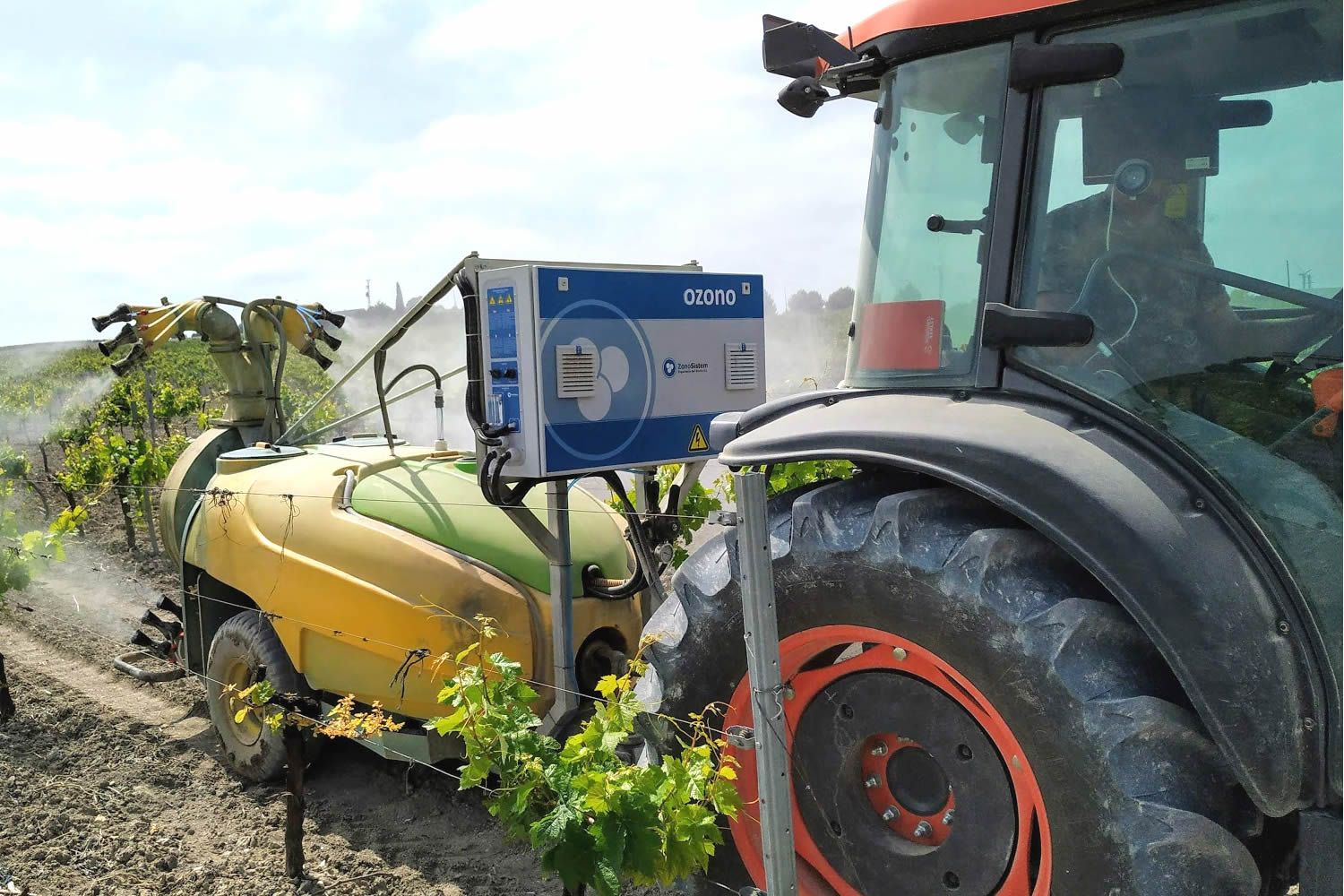
Is is easy
1. Fill the tank with clean water.
2. Start the tractor, and turn on the ozone system.
3. Select the bubbling mode from the Tablet.
4. Wait until reaching at least 0.5 ppm or Redox equivalent.
5. Spray the plant.
6. Activate the online injection mode to raise the ppm.
7. Verify in the graph that the treatment is being effective.
What are the keys to the success of foliar treatment with ozone?
Ozone concentration
The minimum amount ir applies is 0.5 ppm. But the more ppm you have the better. It will depend on the power of the ozone equipment and on its ozone dilution system.
Litres per hectare
It depends on each crop and its foliage. We will advise you specifically for your crop and problem.
What time the treatment is performed
It depends on each crop. Consult our specialized technicians.
Agricultural sprayer features
Cleanliness / flow and pressure of the pump / type of nozzles.
Consult our specialized technicians how to get the most out of your atomizer.
To achieve a successful treatment, you must understand that ozone must come into contact with the microorganisms that you intend to eliminate. It also needs to happen with a sufficient concentration of ozone and contact time.
In summary
The equipment must have sufficient power and good contro. It will allows you to know the ppm of ozone or the Redox potentia at all times.
The farmer must know how much ozone to apply, when and how to apply it.
Having specialized technicians who advise you when defining your hygiene plan is essential to achieve success.
What ozone equipment is suitable for foliar treatment?
Recommended ozone generators for foliar treatment
- Max. concentration100 gO3/Nm3
- Oxygen concentrator
- Compressor and filtration and drying unit
- Double automated ozone output
- Control from the tractor cab
- Redox meter +- 2.000 mV
- O3 ppm meter (optional)
- Power supply 12V-60A
- Max. concentration100 gO3/Nm3
- Bottle of oxygen
- Compressor and filtration and drying unit
- Double automated ozone output
- Control from the tractor cab
- Redox meter +- 2.000 mV
- O3 ppm meter (optional)
- Alimentación 12V-35A-12A
1. Do I need an equipment with an oxygen concentrator or a bottle of oxygen LOX?
If you have enough free amps in your alternator, GZO-D range with an oxyge concentrator will be more suitable for you.
If your alternator does not have enough amps, or you won't be using the equipment much G-D range might be more suitable for you. It has a bottle of oxygen (LOX). This option is cheaper and consumes less amps.
2. What amount of Ozone do I need in foliar treatment?
For tanks up to 2,500 litres, 10gO3/h of ozone. For tanks up to 5,000 liters 20gO3/h.
If your economy allows it, do not hesitate to purchase the 20gO3/h one even if you have a tank of less than 2,500 litres. There are no adverse effects and you will increase the probability of success. Make sure that the manufacturer you choose is reliable and the production of the data sheet matches reality.
3. Do I need a control to guarantee the treatment?
Many farmers demand to know the amount of ozone they inject into their crops. Being able to monitor the gas from the tractor cab at all times is essential to achieve this. Would you put fuel in your car without knowing if it is gasoline, diesel or water? Would you pay if the pump does not measure the liters?
4. 4. Do you need double ozone output?
Injecting ozone in the water line achieves more ppm than bubbling. However, not all spray pumps admit a gas into the fluid. Having the two systems controlled from the tractor cab will allow you to alternate and get the most out of your investment.
5. Do I need a Redox Meter? Do I need a ozone ppm meter?
Measuring the disinfection power is essential in this treatment. Ozone is not like a bottle of bleach, which comes at a known, stabilized sanitizer concentration. Ozone depends on many factors. It must be measured in situ in real time and continuously. That will give you the total certainty that the time and money you are investing in doing the treatment is being really effective. If you buy ozone for your atomizer, always have at least one Redox meter. If your budget allow it, do not hesitate to purchase a dissolved ozone ppm meter. The measurement is more reliable, and covers a larger spectrum of water types.
GZO-D RANGE for agricultural sprayers. Agricultural foliar treatment.
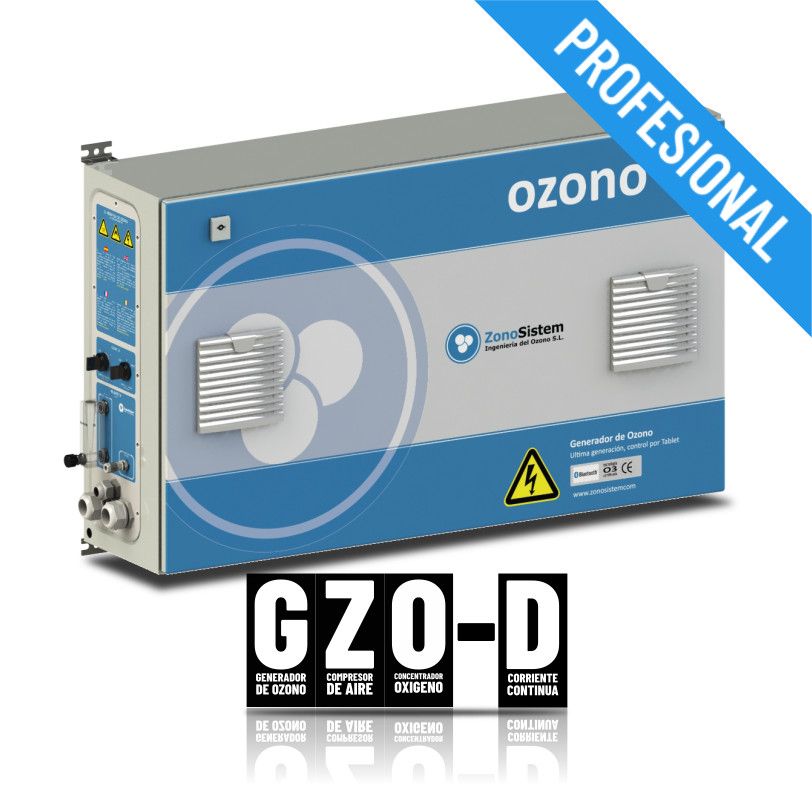
This ozone generator inclides an oxygen concentrator
Select the model based on the volume of the tank of your agricultural sprayer.
| Models | G40-D | G20-D | G10-D |
|---|---|---|---|
| Recommended for sprayer tanks up to | up to 10,000 litres | 5.000 litres | 2.500 litres |
| Ozone production | 40 gO3/h | 20 gO3/h | 10 gO3/h |
| Oxygen concentrator | PSA 10 lpm Incluided | PSA 5 lpm included | PSA 3 lpm included |
| Main measuring method | Redox +- 2.000 mV | Redox +- 2.000 mV | Redox +- 2.000 mV |
| Control system | Touch screen + android system for tablet of mobile phone | Touch screen + android system for tablet of mobile phone | Touch screen + android system for tablet of mobile phone |
| Ozone dilution system | Bubbling+ Injection in the water line | Bubbling+ Injection in the water line | Bubbling+ Injection in the water line |
| Power supply | 12V-90A | 12V-60A | 12V-40A |
| Technical data sheet | QUOTATION | QUOTATION | QUOTATION |
G-D RANGE for installation in agricultural sprayer. Agricultural foliar treatment.
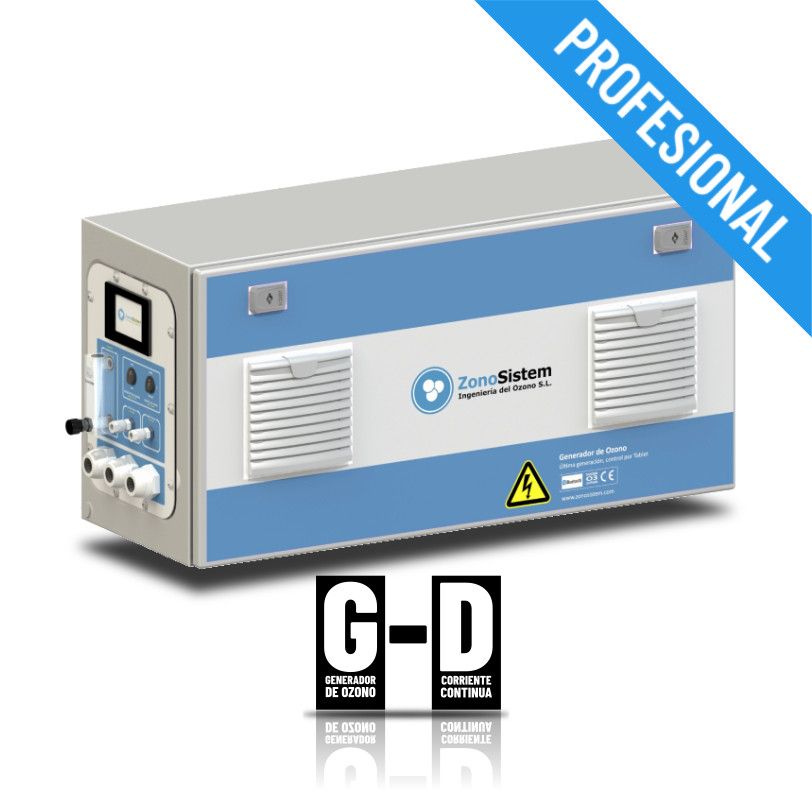
Oxygen will be supplied from LOX
Professional Ozone Generator without oxygen concentrator. It has a powerful control unit. It is used for agricultural sprayers.
It needs a supply of oxygen to function.
Select the model based on the volume of the tank of your agricultural sprayer.
| Models | G40-D | G20-D | G10-D |
|---|---|---|---|
| Recommended for sprayer tanks up to | up to 10,000 litres | 5.000 litres | 2.500 litres |
| Ozone production | 40 gO3/h | 20 gO3/h | 10 gO3/h |
| Oxygen concentrator | No incluida 10 lpm | Not included 5 lpm | No incluida 3 lpm |
| Main measuring method | Redox +- 2.000 mV | Redox +- 2.000 mV | Redox +- 2.000 mV |
| Control system | Touch screen + android system for tablet of mobile phone | Touch screen + android system for tablet of mobile phone | Touch screen + android system for tablet of mobile phone |
| Ozone dilution system | Bubbling+ Injection in the water line | Bubbling+ Injection in the water line | Bubbling+ Injection in the water line |
| Power supply | 12V-35A | 12V-17A | 12V-12A |
| Technical data sheet | QUOTATION | QUOTATION | QUOTATION |
More than 600 equipments working
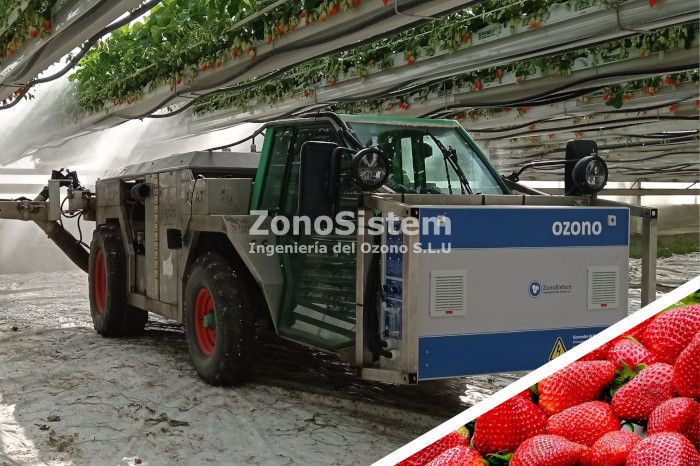
Ozono para cultivo hidropónico de Fresas. Lompian, Francia.
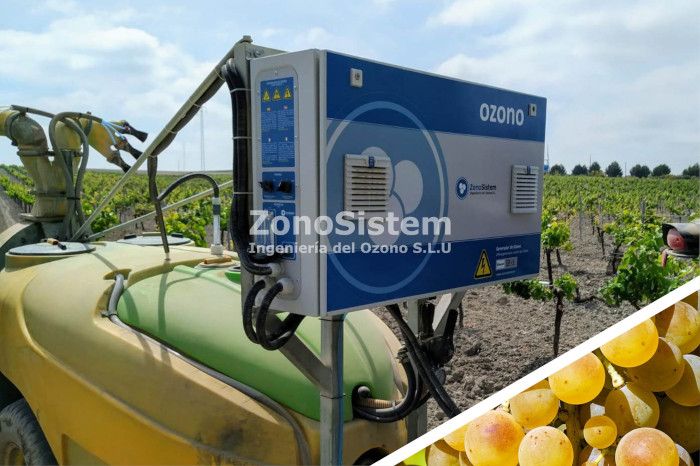
Ozone for Vineyard in Jerez de la Frontera, Cádiz, Spain
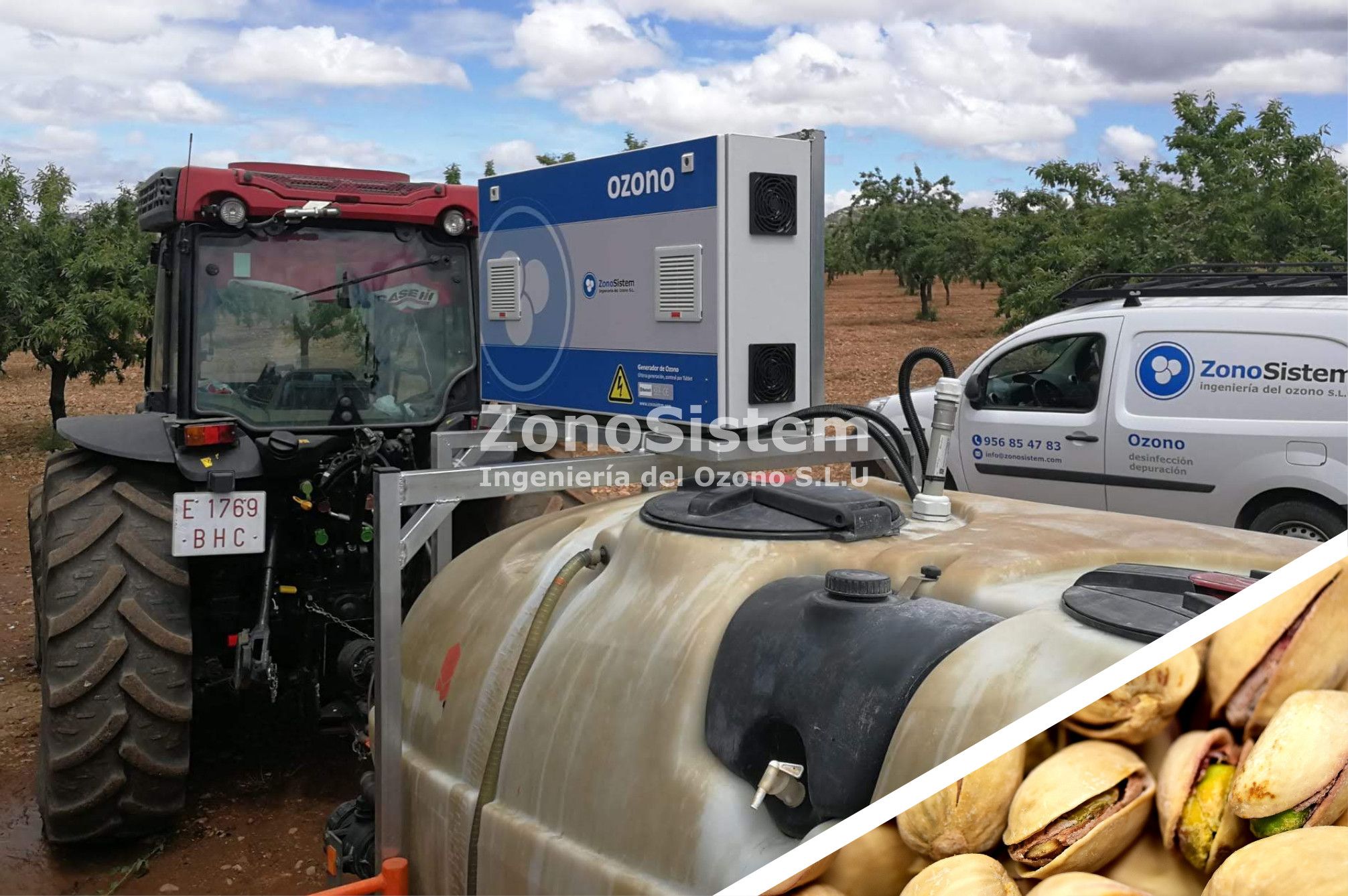
Ozone for Pistachios, Granada, Spain.
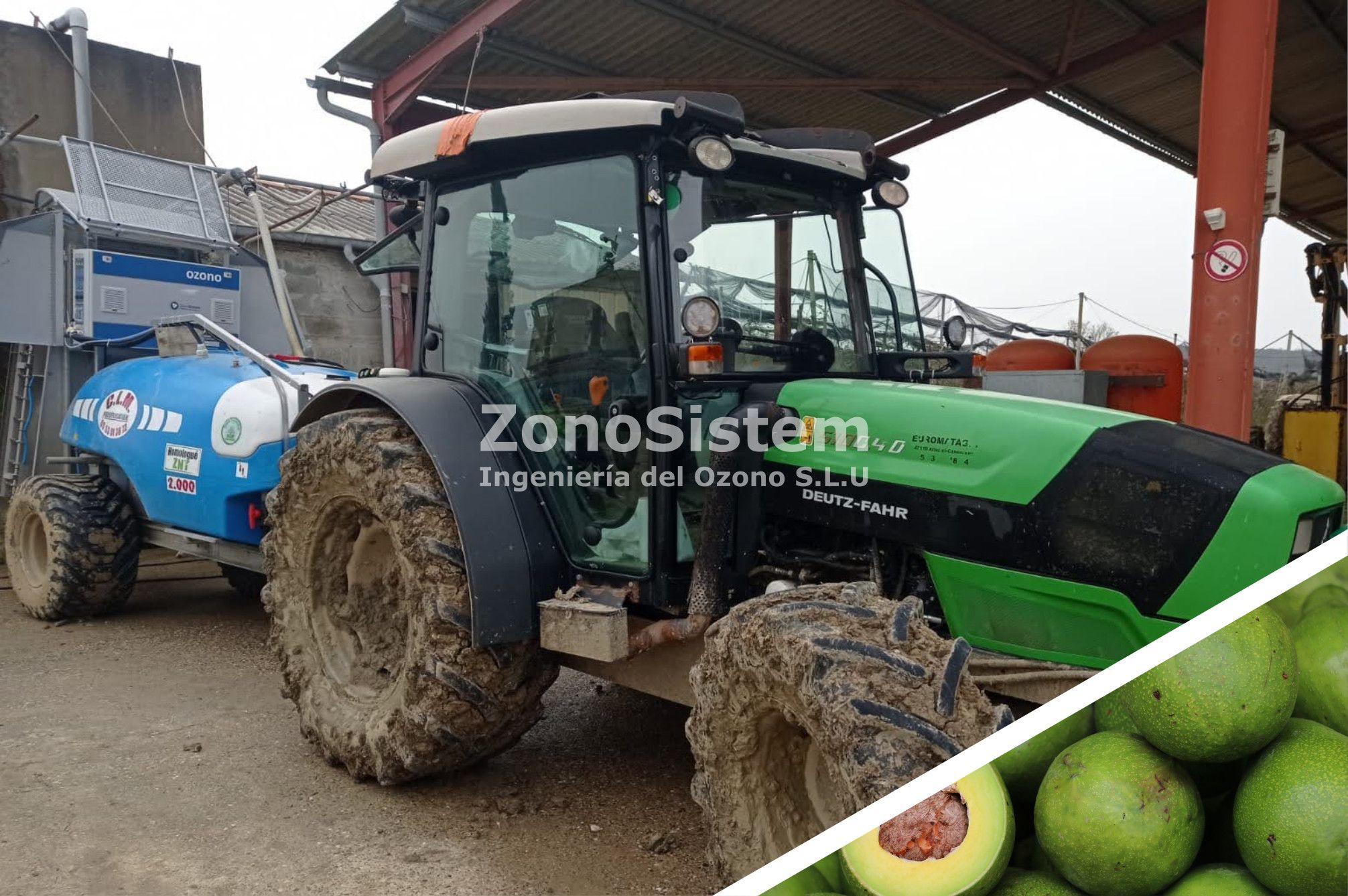
Ozone for Avocados, Malaga, Spain.
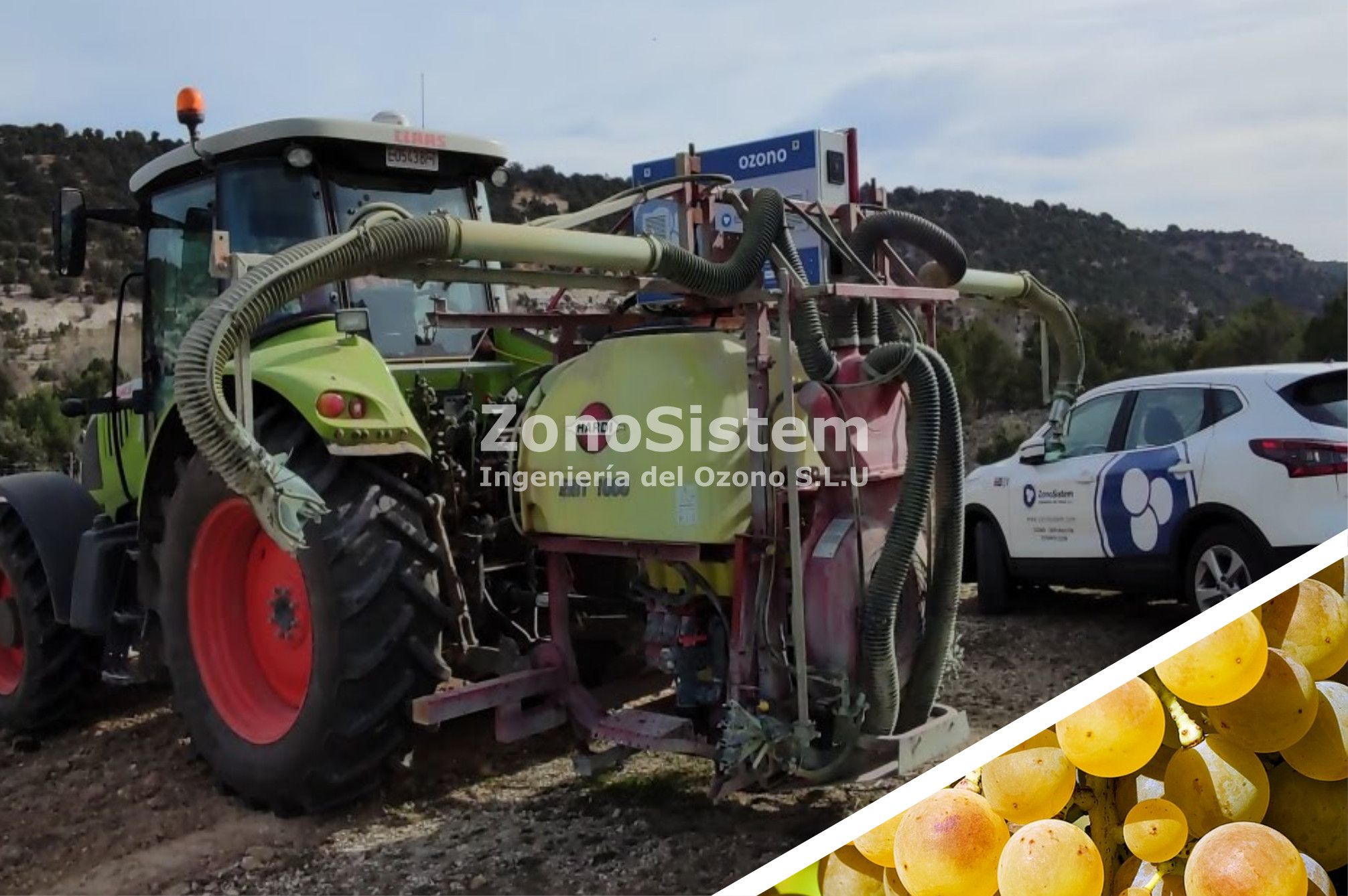
Ozone for Vineyard, Ribera del Duero, Spain.
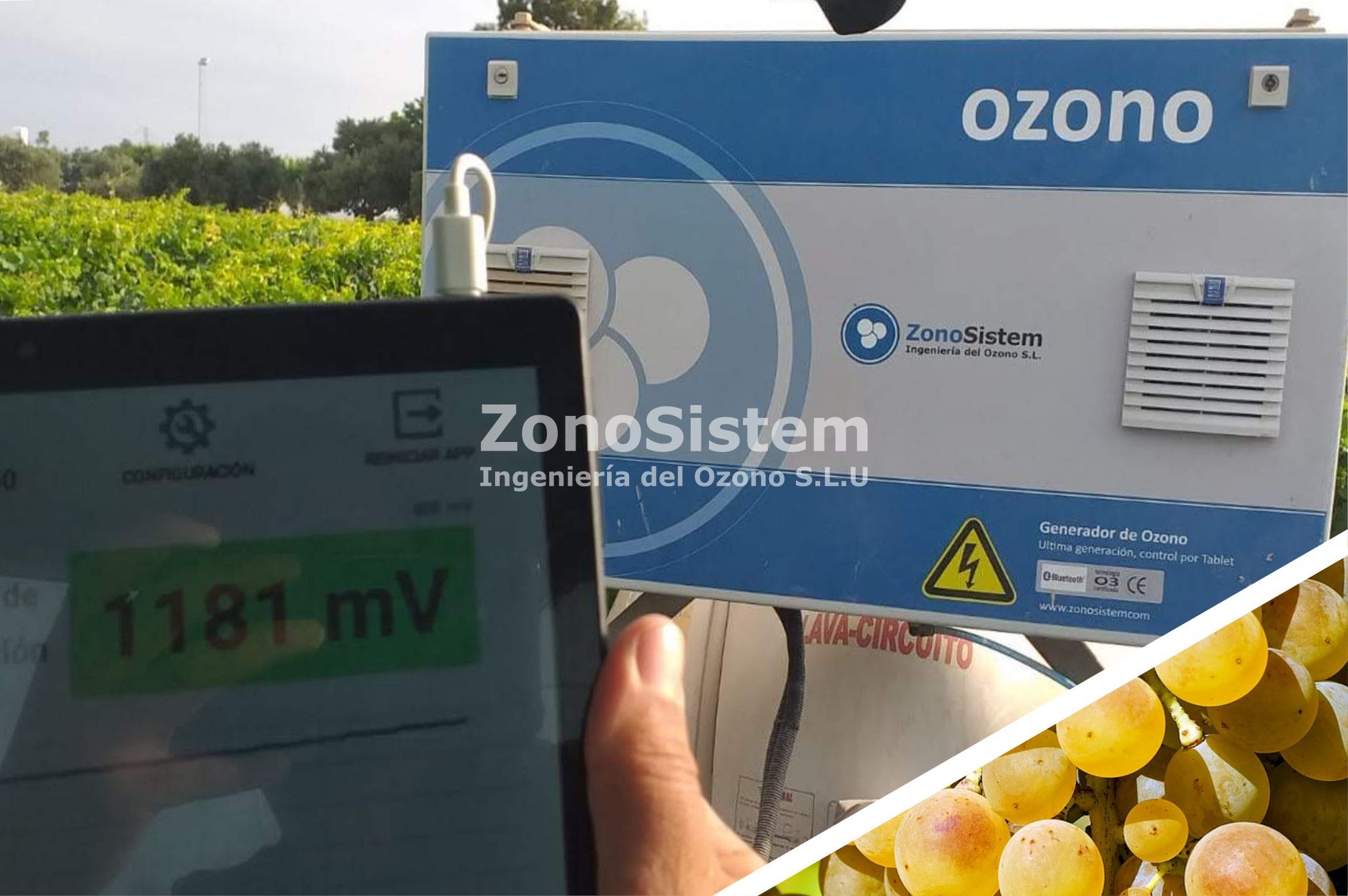
Ozone for vineyard, Jerez, Spain.
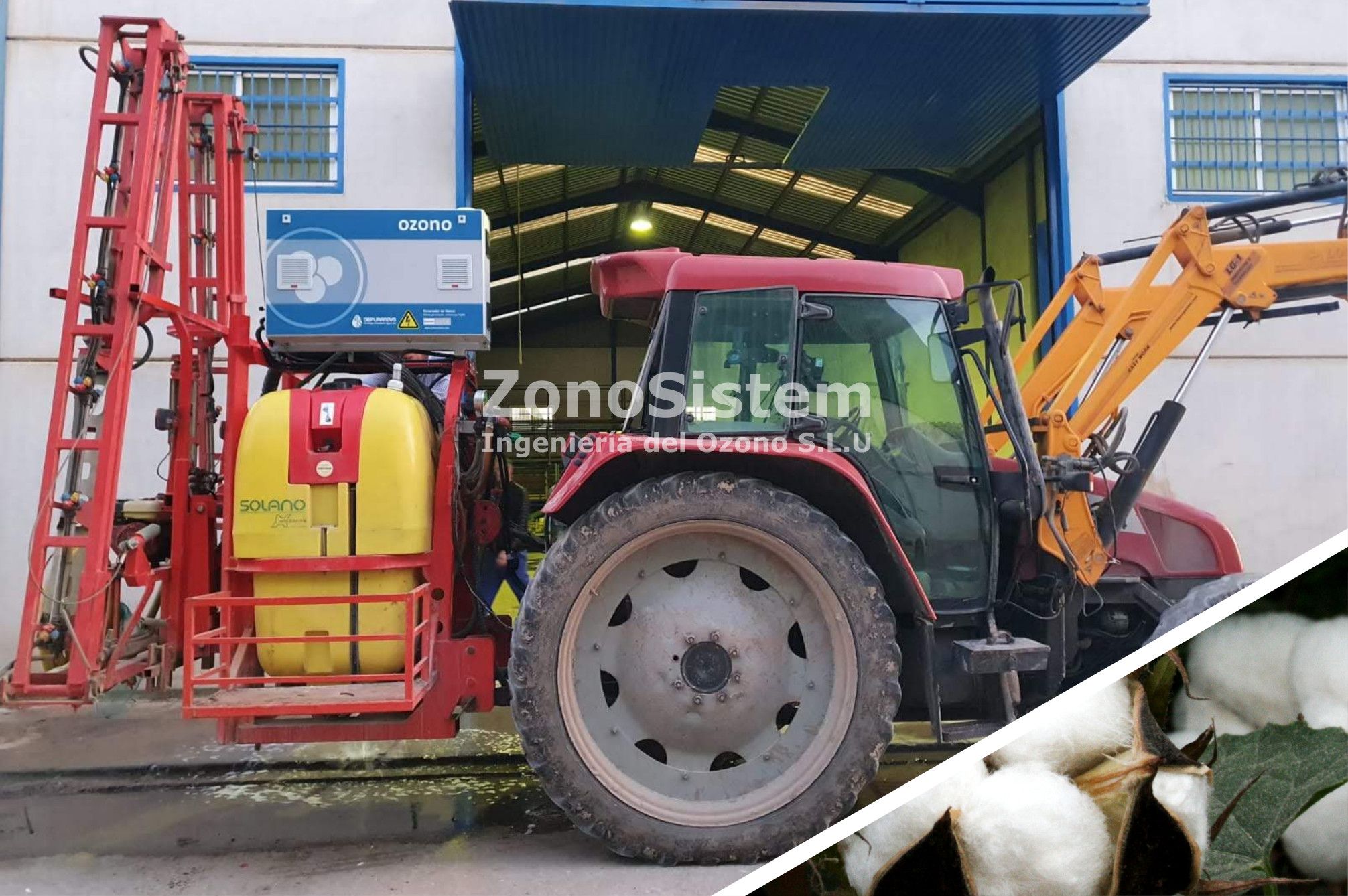
Ozone for Cotton. Sevilla Spain.
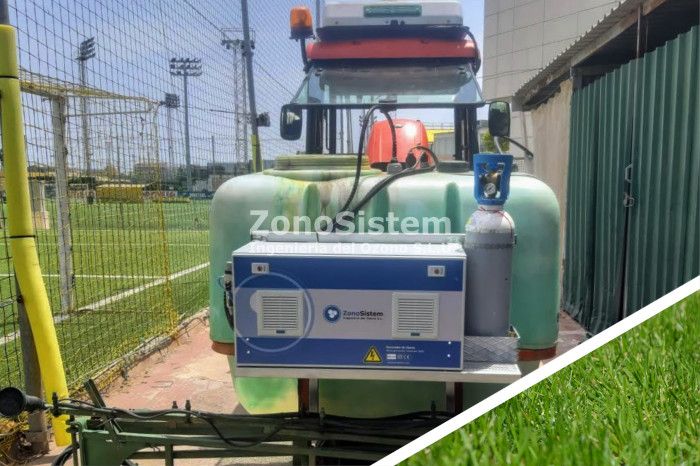
Ozone for grass, Villareal CF, Castellón, Spain
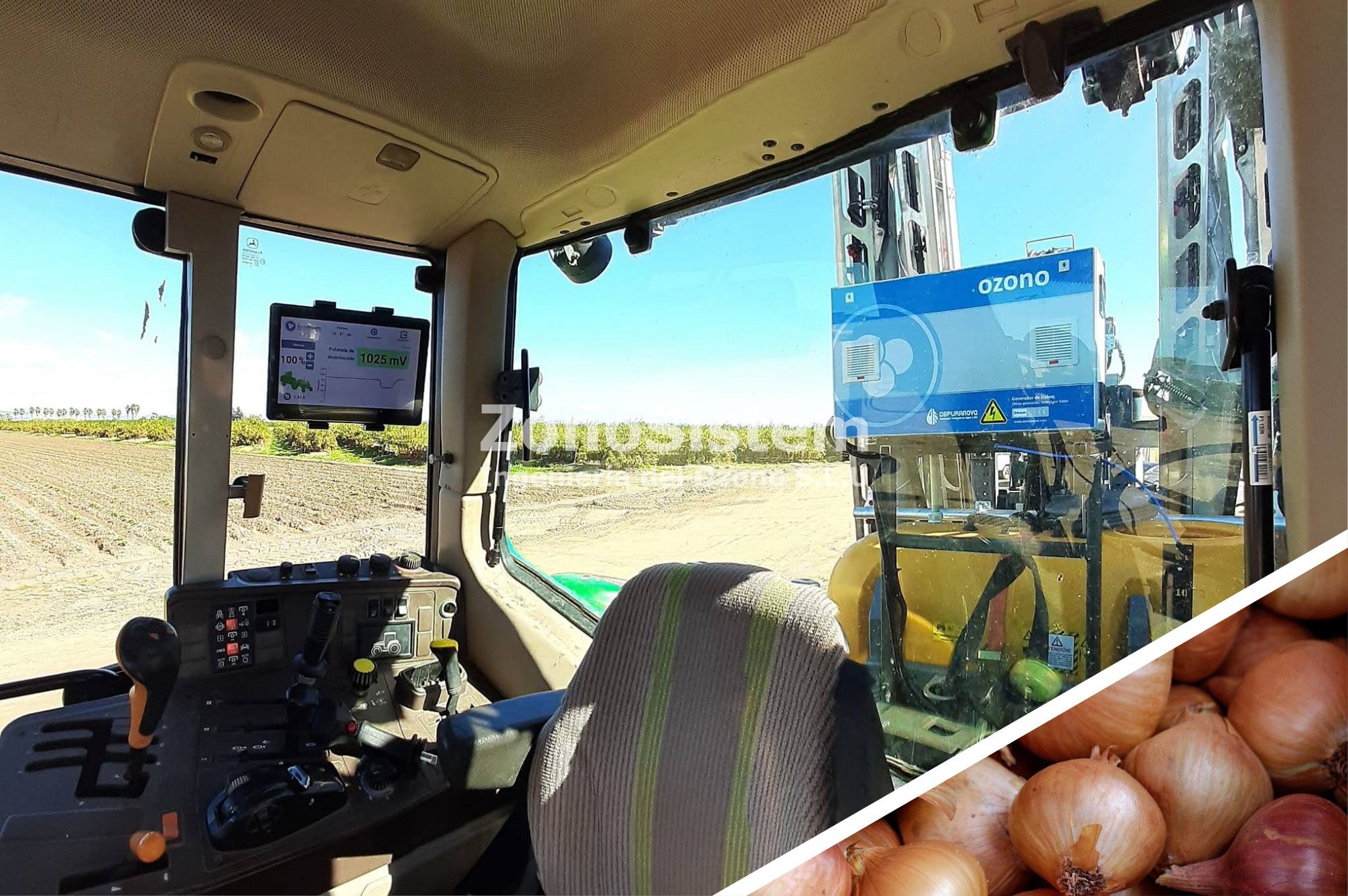
Ozone for growing onions. Valencia Spain.
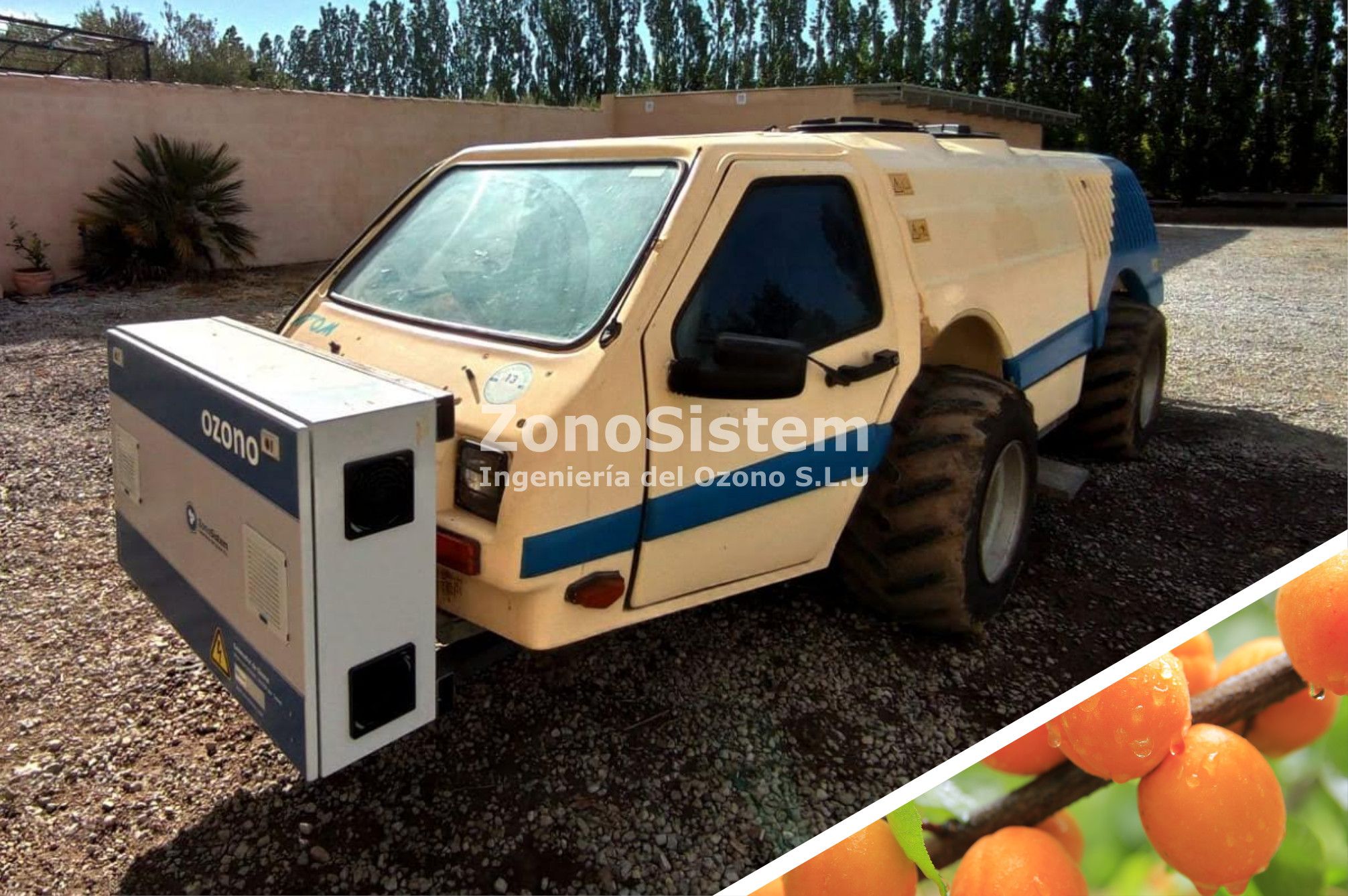
Ozone for cultivation of Apricots, France.
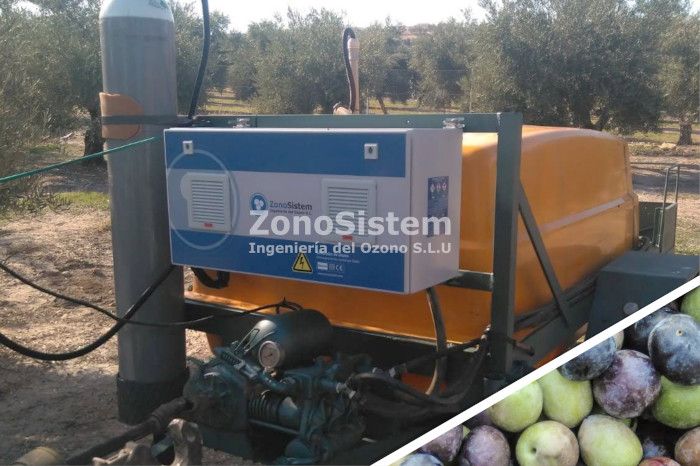
Ozone for olive cultivation. Jaen, Spain.
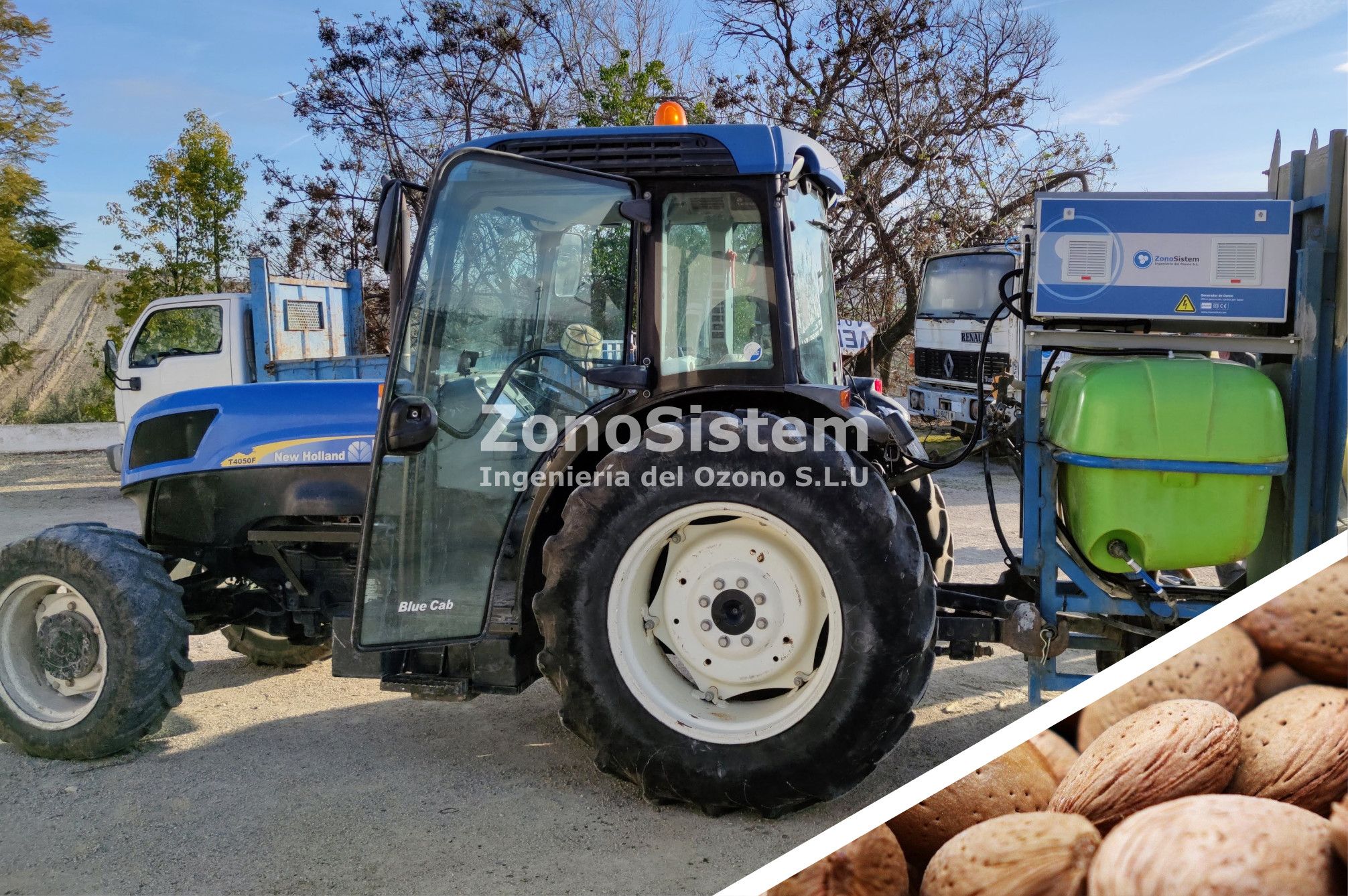
Ozone for almond trees, Granada, Spain.
Frequent questions
What kind of diseases can ozone correct or prevent as a foliar treatment?
Ozone according to the (WHO) is the most efficient disinfectant that exists. It could be said that there is no microorganism that resists the action of ozone.
Main phytopathogenic fungi that affect crops.
Mildiu (it is not a species, it is how the disease caused by several species of fungi is known. Plasmopara viticola affects grapevines; and Phytophthora infestans affects solanaceous plants such as tomato and potato). Oidium (it is not a species, it is how the disease caused by several species of fungi is known. Erysiphe necator is the main one). Rust (it is not a species, it is the disease caused by various species of fungi, the main genus Puccinia. Blight (disease caused by various species of Alternaria solani, Phytophthora infestans. Alternaria cineraiae. Botrytis cinerea. Botrytis squamosa. Fusarium oxysporum. Ramularia cynarae. Verticillum dahliae. Phythofthora sp. (this genus has several species that affect different crops and different parts of the plant, especially the root). Sclerotinia Colletotricuhum. Melampsora lini Phoma sp. Fumagina. Spilocaea oleagina. Anthracnose (disease caused by several species of fungi). Stereum hirsutum and Phellinus igniarius. Plystigma fulvum. Monilia laxa (most important disease of the almond tree) Leprosy of the almond tree (Taphrina deform ans). Fusicoccum. Stigma carpophila. Mycospharella. Venturia inaequalis. Septoria. Pythium sp.
What type of crop can we treat with ozone?
Ozone can sanitize all types of crops: trees and bushes; intensive, super-intensive and extensive; irrigated and rainfed.
Ozone for: tomato, cucumber, pepper, zucchini / potatoes, onion, garlic, carrot, sweet potato / lettuce, watercress, green leaves / blueberry, strawberry, strawberry, blackberry, red fruit / melon, watermelon / vineyard. Ozone for olive / orange, lemon, mandarin / hemp / apple, pear, avocado, banana, pineapple, mango / almond and pistachio / crops to feed livestock. barley, beet / For textile crops, fibers used in clothing, sheets, industry and household products (hemp, cotton, linen, bamboo) / For oil crops. For the production of vegetable oils (rapeseed, sunflower, olives) / For ornamental crops. For home decoration and landscape design (garden, pots, bushes) / Ozone for industrial crops. For industrial manufacturing (rubber).
Why is it important to reduce the use of traditional chemicals?
The trend in agriculture is clear:
1. Improving the final product (Biological Agriculture).
2. Contaminating the environment less (ecological agriculture).
3. Spending less (Profitable Agriculture).
It is true that the chemical industry is very powerful.Thanks to it, many industrial and agricultural processes have been optimized and controlled.
However, many of these chemical products are persistent and leave traces or residues that reach consumers. That is why there us such an exhaustive control by health administrations. There is also a negative impact on the plant, soils and aquifers when you use those chemicals.
Aside from the health and safety risks to people and plants, they are quite expensive.
With ozone you will not leave chemical residues, will not contaminate the environment, and also, you will have significant economic savings.
